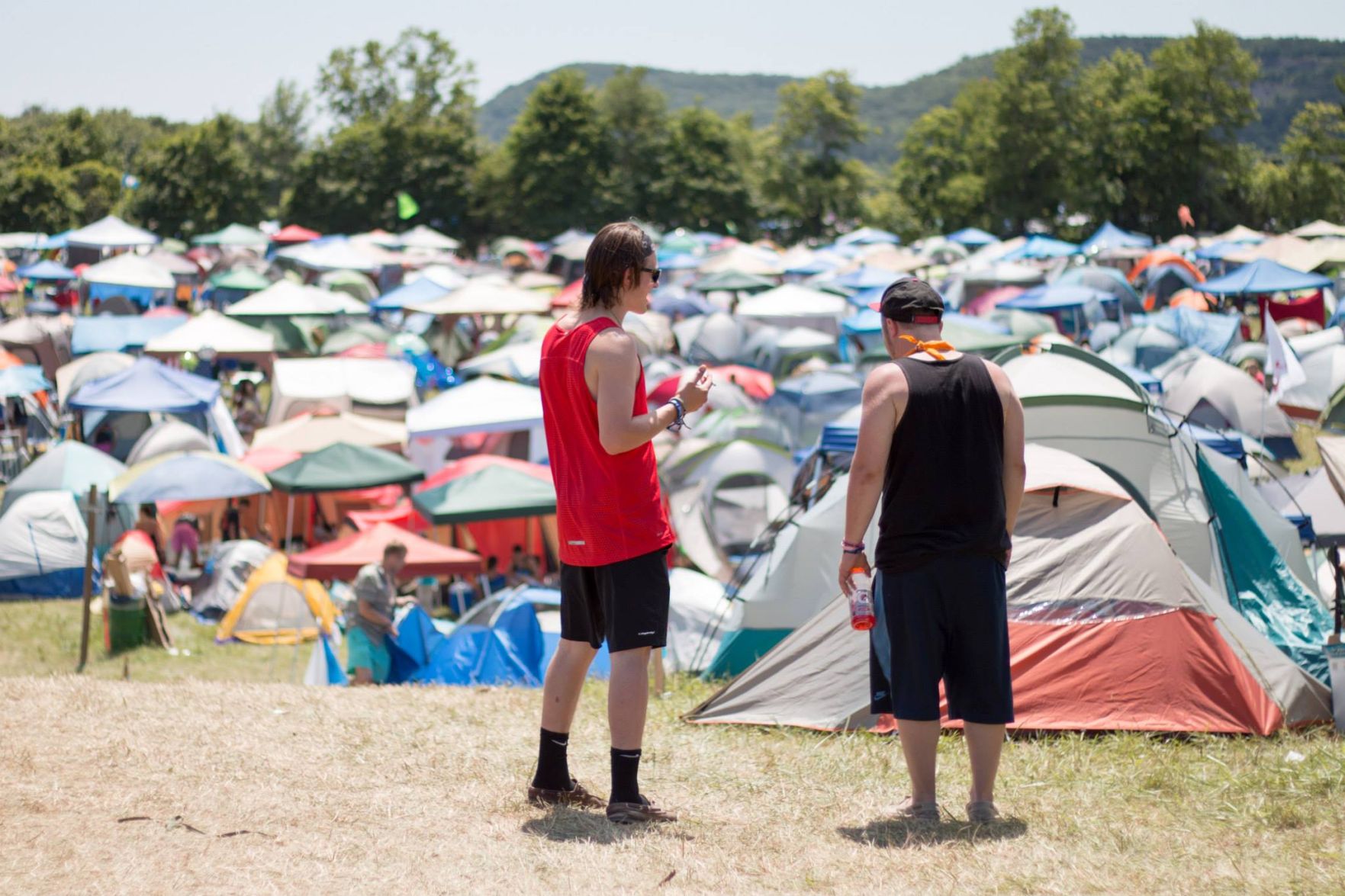
Tents at the Hudson Project Festival, one of several summer music festivals in 2014.

Festivals
Loud music, food, alcohol, camps, parties, oppressive crowds of young people in bright clothing and general anarchic activity — it describes either the most fun possible on a sunny summer day or a cruel and twisted form of torture. Regardless, summer music festivals continue to draw the world’s youth and the world’s youth’s money to prominent cities and large green spaces across the country. Debates about the true end of summer and beginning of fall aside, Boston Calling was the last big festival of the summer 2014 season.
Summer 2014 saw the return of many of the most famous — or infamous — American music festivals, divided between the sprawling campground shows and the bustling city spectacles. Kicking things off in early June was the Governor’s Ball in New York City, featuring OutKast, Jack White, The Strokes, Vampire Weekend, Skrillex and more — a collection of bands that would perform in many more festivals throughout the summer.
Next up was perhaps the greatest example of the camping festival experience (the one most likely to excite or terrify you, depending on your personality): Bonnaroo. Set in Manchester, Tennessee, Bonnaroo was an exhausting and exciting deluge of big name acts like Kanye West, Skrillex and Vampire Weekend (again), Frank Ocean, The Avett Brothers, Neutral Milk Hotel, Arctic Monkeys and more. Those brave enough to fight the heat over many days were treated to a sensory experience that’s difficult to replicate.
In late June, the still-young Delaware festival Firefly cultivated a line-up of big names like the Foo Fighters, OutKast, Jack Johnson, Weezer, Imagine Dragons and more. Hopefully Firefly can continue its growth as a music festival, perhaps drawing even bigger and better bands to the area.
Not to be outdone by the woodlands of Delaware and Tennessee, Chicago’s massive Lollapalooza featured a vast assortment of bands from most genres, including headliners Eminem, Arctic Monkeys, Lorde, OutKast, Foster the People, Kings of Leon, Skrillex and a huge list of acts from the far corners of hip-hop, electronica, alternative rock and pop.
This past weekend, Boston Calling saw more than twenty acts performing over three days in one of the most vibrant and culturally-rich cities in America, rounding off the summer in spectacular fashion.
Friday featured only three bands, but what the day lacked in quantity it made up for in quality. The opening act of the day — and the entire festival — was local Baltimore legend Future Islands. The band’s strange and catchy synth-pop, coupled with lead singer Samuel Herring’s eccentric dance moves and voice that leaps from low croon to near death-metal growl, started the festival off with a burst of danceable energy. Some in the audience found the performance a bit too strange, but for those in the know, the band easily demonstrated why it’s so beloved among the Baltimore independent music scene.
Afterward, long-dormant indie legends Neutral Milk Hotel took the stage to great applause. Lead singer Jeff Mangum apologized for his sore throat, and while his voice was noticeably weaker than in his fantastic Merriweather Post Pavilion show earlier this summer, the crowd supported him in singing along to all of their favorites.
Finally, the lead act — the somber titans of indie Rock, The National — emerged to a shriek of fannish delight. The band played many songs from its most recent album — Trouble Will Find Me — but surprised fans with a lesser-known gem, “Ada,” from its fourth album Boxer. The horn section even closed the song with the outro from Sufjan Stevens’ Chicago. As usual for the band, they played fan-favorite “Mr. November,” which featured lead singer Matt Berninger stumbling into the crowd to sing while pressed by hordes of fans.
Saturday expanded the roster to 10 acts, the most notable being The Hold Steady, Sky Ferriera, Volcano Choir, Childish Gambino and the lead act, pop icon Lorde. Unfortunately, a freak thunderstorm delayed the performance and led to Volcano Choir and Girl Talk being cut to fit in the rest of the bands. Despite this irritating turn of events, the storm eventually retreated and Childish Gambino and Lorde energized the crowd for an excellent end.
Sunday dawned to much better weather and a line-up that included ’80s punk band The Replacements, indie mainstays Spoon and a supposed collaboration between rapper Nas and acclaimed hip-hop group The Roots. The mostly college-aged audience diverted themselves with several halfhearted attempts at bouncing around a beach ball during much of the day’s performances, and the slowly sliding interest level took a sharper plunge after Nas played his set without The Roots except for one song. There wasn’t much crowd interest, and though The Roots tried valiantly to save the spirit of the show, Boston Calling ended with a whisper instead of a bang.
Despite some setbacks and the unpredictable weather, Boston Calling managed to still be an excellent way to end the summer for all those raucous music fans in the Boston area. It pulled together a diverse and impressive line-up with a little something for everyone.
Overall, this summer showed that despite heat, artist predicaments, injuries, rain and other problems, people still flock to summer music festivals, eager to catch the energy of the music world’s biggest, best and most intriguing acts. But the festivals did suffer a bit from a bit of homogeneity. Several big name performers such as Childish Gambino, OutKast, Arctic Monkeys, Nas, Lorde and more dropped in at several festivals.
Of course, if you’re a huge fan of these bands, this is nothing but good news, but there’s something to be said about each festival having its own unique collection of big names. Let’s hope that in the future the festivals can continue to be successful while also taking bigger risks in the artists they bring along.



